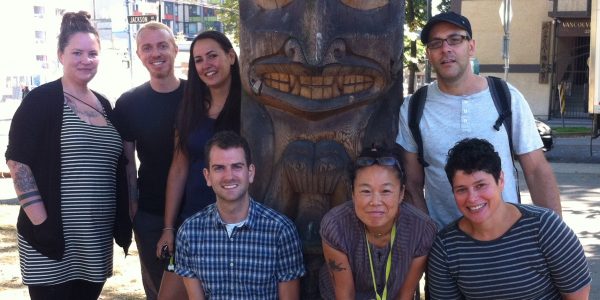Intensive Case Management Team (ICMT) now in the DTES community
New outreach program serves clients with complex health and social support needs
Kevin Hornbrook is an RN on a mission. Today, he’s off in search of “Joe,” a resident of the Downtown Eastside (DTES) who can often be found on the streets near Oppenheimer Park. Once found, Joe tells Kevin he needs somewhere to stay, and Kevin initiates a housing referral. As they talk, Kevin notices an infected area on Joe’s leg, makes an assessment, and connects with a physician for some antibiotics. With today’s mission accomplished, Joe is on his way, and Kevin continues down the street in search of other clients.
“We find the opportunity to engage with clients, even if it’s just to assist someone to get some more cell phone minutes. Once an immediate need is met, we might be able to connect to assist with health or social support issues,” says Kevin. “The team is out looking all the time, finding our clients and making those connections.”
Kevin is part of the new Intensive Case Management Team (ICMT) working out of the DTES. The ICMT provides a true team outreach service to DTES residents who have moderate to severe substance use needs. The team includes a physician, nurse practitioner, nurses, social worker and health care worker, and soon, peers, who work together to meet the health and social needs of clients who have difficulty accessing traditional health care services.
ICMTs are part of the Ministry of Health’s defined continuum of care, with the goal to “improve health, social functioning, and access to care,” as described in their 2014 Model of Care Standards and Guidelines. VCH has embraced the opportunity to meet clients literally where they are, whether in a park, a shelter, or their own home. The work of the ICMT is well-aligned with the goals and objectives of the Second Generation Strategy.
The team is in its early days, working first with clients referred through the emergency department Familiar Faces cohort and VCH’s DTES services. Staff work to not only find the clients, but to build rapport and create the space required to provide health intervention and connections to social supports.
“We approach people with no judgement, and over time, this opens up a space to interact. With the various mental health and substance use issues, people’s lives can be quite chaotic, and we hope our connection with them will provide access to the services they desperately need,” says Lara Ellison, Social Worker with the ICMT. “Our relationships with clients are non-transactional; at times, we just ask, ‘What can we do for you?'”
All team members have a strong understanding of the impact of trauma and practice through the lens of harm reduction. Services are brought to the client wherever they are, and goals are their own: no goal is too small for the team, as every interaction builds relationships with the hope of eventual stabilization and connection to longer-term services (e.g. through a CHC).
The stigma for DTES residents related to substance use, mental health issues and poverty remains, but the team moves forward, with the intention of social justice and the understanding of the inequities caused by past trauma in people’s lives. Smadar Levinson, ICMT Team Leader, explains:
“I see stories of resiliency above it all. The people we serve have incredible passion. They are the ones holding onto the hope to continue to look for better lives for themselves.”


Mary Ackenhusen, CEO
I have huge admiration for the good work that the DTES ICM team is undertaking – good work!
Mary